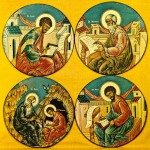 Though it is risky to guess at the purposes of God, one may reasonably ask why He chose certain men, and only four, to write His New Testament Gospels—Matthew, Mark, Luke, and John. Two were not even apostles, and there were some remarkable apostles, such as Andrew and Philip, who wrote no Scripture at all. Among the other apostles, Peter wrote epistles and was likely the primary source for Mark’s Gospel, but the majority of apostles were simply not biblical authors.
Though it is risky to guess at the purposes of God, one may reasonably ask why He chose certain men, and only four, to write His New Testament Gospels—Matthew, Mark, Luke, and John. Two were not even apostles, and there were some remarkable apostles, such as Andrew and Philip, who wrote no Scripture at all. Among the other apostles, Peter wrote epistles and was likely the primary source for Mark’s Gospel, but the majority of apostles were simply not biblical authors.
What we do know is that God is perfect, and that His choice of writers to inspire and superintend was flawless. So what do the four demonstrate? Here are some brief observations:
1. Complementarity: Matthew writes to a predominately Jewish audience, and gives us large preaching passages, including the Sermon on the Mount. Mark presents an action-packed account of Jesus’ deeds. Luke gives us the Christmas story and majors on parables. John begins with a great theological statement and then devotes almost the last half of the book to Jesus’ final week on earth. Matthew and Luke present genealogies. John gives us “John 3:16.” Mark likes the word “immediately” and, alone, calls the grass at the feeding of the 5,000 “green.” Luke is the only one to mention Jesus’ post-resurrection appearance on the road to Emmaus. In other words, God uses four very different men to cover the field beautifully.
2. Spiritual Gifts. In the body of Christ, some are gifted as administrators, some as handyman helpers, some as friends to the friendless, some as thundering prophets, and so on. Not every one is gifted in written communication. Regarding the Gospels, God chose and enabled/empowered key writers to get out the word. Their calling was not for everybody, no matter how wonderful the non-writers were in their own right, nor how close they were to Jesus.
3. Grace. When one reads Jesus’ genealogy in Matthew, one sees some pretty embarrassing things in His bloodline—a harlot named Rahab, a murderous adulterer named David, a descendent of an incestuous union named Ruth. Yet God salvages and uses doubtful people for His purposes. In the Gospels, we see the work of a despised tax collector (Matthew), a fellow who proved to be a major disappointment on the mission field (Mark), a man most suppose to come from the “unclean” Gentile ranks (Luke), and a disciple who, with his brother James, showed a streak of selfish ambition, not to mention a “thunderous” temper (John). In short, they were all “trophies of grace,” and not just the cream of the culture, which Jesus ladled off the top to write Scripture.
4. Accountability. Unlike the Koran or the Book of Mormon—“scriptures” where we have to take one man’s word for it (Mohammed; Joseph Smith) that he got it from God—the Bible brings many voices into play, with cross checks from source to source. And once the writings have emerged, then the people of God, guided by the Holy Spirit, have recognized which voices have genuinely represented God’s truth and which ones have not. The Bible we have reflects the consensus of the redeemed, and does not ask for all-or-nothing trust in a lone voice presuming to speak for God. To the voices of these four, the Church has added countless witnesses to the veracity and power of these Gospels.